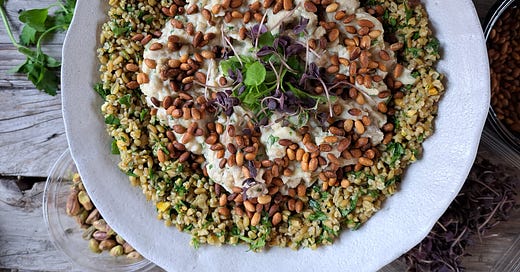Israel's plant based revolution...
how the biblical landscape has become the vegan capital of world
In the past five years, Israel has been decorated with the title of global leaders in promoting the plant based diet, with the vibrant city of Tel Aviv recently having been awarded the top accolade of “vegan capital of the world”.
With 5% of the population feasting upon a vegan-friendly diet, it seems that the fresh produce of the Mediterranean together with the country’s religious culinary laws bound from an historical relationship with the biblical landscape and the aspirations for healthy eating has evoked this plant based revolution, encouraging chefs, home cooks and culinary innovators to create masterful vegan food, full of Middle Eastern flavour.
There appears to be some scepticism within the UK about the rise in plant based products sitting on the supermarket shelves, and whether the ingredients are natural and without additives. According to a recent article in The Times by Rod Liddle, a closer inspection of labels shows the addition of sugar and salt in many of the ready made meals, seemingly to add flavour to these often bland attempts at pastas, curries and pies. The reality in Israel is that with an abundance of protein rich legumes, ripe, seasonal vegetables and the wild edibles full of the essential vitamins and minerals needed for a balanced healthy diet, simplistic vegan cooking is becoming the new culinary idealism and managing to sustain the hospitality industry, in hard economic times.
The Jewish dietary laws as set out in the Bible seeks to minimise the suffering of any animal and may contribute to the why this nation is advocating veganism, even amongst the religious communities. Referenced in Genesis 1:29, God bestowed upon man ‘every herb bearing seed, which is upon the face of all the earth, and every tree, in the which is the fruit of a tree yielding seed; to you it shall be for meat’, possibly another impetus for the natural evolution to plant based eating in the ancient land.
Despite meat being a main ingredient in the traditional Ashkenazi, Sephardic and Arabic cuisines, the influx of gastronomic immigration to Israel and the establishment of kibbutzim in 1930’s saw the launch of food from ‘the farm to the table’ where the ‘baladi’ vegetable, the Arabic term for organic and from the land, was seen as the hero ingredient on the plate. Nearly a century later, the vegan revolt has now encompassed eating nutritious, indigenous foods with animal wellbeing, sustainability and world poverty at its core, inspiring chefs across the country to change their menus in favour of meatless dishes.
In 2011 the concept of a whole roasted cauliflower, was the brainchild of internationally renowned celebrity chef Eyal Shani and became his signature dish when served in warm pita bread in his highly acclaimed Tel Aviv restaurant, Miznon. Not essentially a vegan eatery, this innovation in cooking of individual vegetables paved the way for pioneering development in veganism in both products and restaurants.
There is no doubt that the best vegan friendly eateries, street stalls and restaurants can be found in the buzzing city of Tel Aviv, ranging from the cheap fast food joints to the high end restaurants where extraordinary chefs are pushing the boundaries in plant based dishes. However, as more and more of the population lean towards healthy eating and removing meat from their diet, many of the eclectic cuisines are offering plant -based menus in authentic Arabic, Thai and Indian food. From Kiryat Shmona in the north to Mitzpe Ramon in the south, they are all vying for the recognition of providing traditional and contemporary vegan food, that above all delivers on flavour.
As many of the Israeli wines are made under the dietary laws of Kashrut, they qualify as vegan-friendly having no animal ingredients or their by-products being used in the wine making the process. Fining methods often use gelatin, egg whites and dairy proteins such as casein and isinglass for clarification and filtration, enhancing the colour and aromas of the wines. By adding bentonite, a clay from aged volcanic ashes, the impurities can be drawn out using a natural ingredient. More commonly used when producing white wines, many boutique wineries are changing to using this organic and ethical way of refining their wines, enticing the vegan market to wine tastings paired with plant based offerings.
With the rising costs of living and the expense of meat, fish and dairy, economic factors may be playing a part in the plant based revolution here in the Israel where indigenous fruits, vegetables and legumes grown across the ancient landscape since the biblical era remain a cheaper way of eating. The strong beliefs in healthy eating, nutritious food, the protection of the environment and prevention of animal suffering all add to the evolving culinary culture of a vegan-friendly diet that demands quality and flavour.
Over the coming weeks Cultural Bites will bring you a taste of the delicious plant based foods served in eateries around the country, fine vegan-friendly wines from boutique wineries and innovative products that are taking my taste buds on a journey through the Israeli bounty, as well as some of my easy to make recipes using fresh, seasonal ingredients, for all the family to enjoy over the summer holidays.
Enjoy & L'Chaim!







